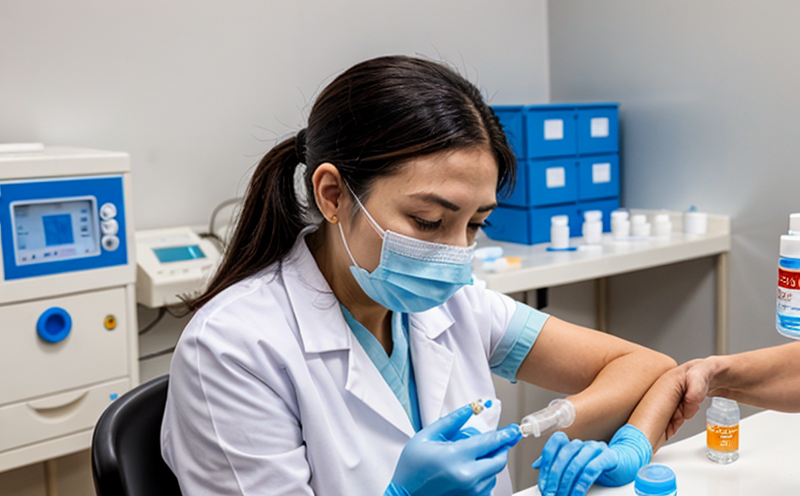WHO Accelerated Stability Testing of Vaccines
The World Health Organization (WHO) accelerated stability testing is a critical process in ensuring that vaccines meet stringent quality control standards and remain stable under real-world conditions. This test involves assessing the shelf-life, efficacy, and safety of vaccines by simulating long-term storage conditions over a significantly shorter period.
This accelerated method adheres to WHO guidelines and is designed to mimic extended storage at higher temperatures than those typically experienced during normal transportation and distribution. The goal is to predict how the vaccine will perform under worst-case scenarios, thereby ensuring its safety and efficacy for public health use.
Our laboratory uses state-of-the-art equipment and follows stringent protocols to conduct this testing accurately. We employ advanced analytical techniques such as high-performance liquid chromatography (HPLC), mass spectrometry (MS), and thermogravimetric analysis (TGA) to monitor various parameters that influence the stability of vaccines, including moisture content, impurities, and degradation products.
The process begins with thorough sample preparation, where each batch of vaccine undergoes rigorous quality checks. This includes visual inspection, potency testing, and preliminary stability studies. Once the samples are prepared, they are subjected to accelerated conditions that replicate extended storage at elevated temperatures (typically 40°C or higher).
Throughout this process, we continuously monitor critical parameters such as pH levels, osmolality, particle size distribution, and overall integrity of the vaccine formulation. This data is crucial for determining whether the vaccine maintains its intended efficacy and safety profile under accelerated conditions.
The results of these tests are then analyzed to ensure compliance with international standards set by WHO and other regulatory bodies. We provide detailed reports that outline all findings, including any deviations from expected stability profiles or potential issues that need further investigation. This information is invaluable for pharmaceutical companies in optimizing their manufacturing processes and ensuring product quality.
By adhering strictly to WHO protocols, we ensure the highest level of confidence in vaccine performance and reliability. Our expertise in this area allows us to offer reliable testing services that meet global standards, making it easier for clients to navigate complex regulatory requirements.
Applied Standards
| Standard Name | Description |
|---|---|
| WHO Technical Report Series 958 | Guidelines for the evaluation of vaccines by accelerated stability testing. |
| ASTM E2003-14(2019) | Standard test method for determination of moisture content in pharmaceutical products using Karl Fischer titration. |
| IUPAC Gold Book Definition: Stability Testing | Testing to determine the shelf-life and chemical stability of a drug substance or product under defined conditions. |
| ICH Q5C | Guidance on accelerated stability testing for new medicinal products. |
Benefits
The benefits of conducting WHO accelerated stability testing are numerous and far-reaching. Firstly, it allows for early detection of potential issues that could arise during long-term storage or distribution. This proactive approach helps manufacturers address any problems before the vaccine is released to the public, ensuring patient safety.
Secondly, compliance with WHO standards enhances credibility and trust among regulatory authorities and healthcare providers worldwide. Meeting these stringent requirements demonstrates a commitment to quality and reliability, which can significantly impact market acceptance and distribution.
In addition, accelerated stability testing provides valuable insights into the shelf-life of vaccines under various environmental conditions. This knowledge is crucial for optimizing storage practices and ensuring that vaccines remain effective throughout their intended use period.
Moreover, this testing process supports ongoing research and development efforts by identifying areas for improvement in vaccine formulations and delivery systems. By continuously refining these aspects, pharmaceutical companies can enhance the overall quality and effectiveness of their products.
The data generated from accelerated stability tests also plays a vital role in regulatory submissions. It provides robust evidence supporting approval applications, which is essential for gaining market access in different countries.
Finally, successful completion of WHO accelerated stability testing fosters collaboration between manufacturers, regulators, and healthcare providers. This collaborative effort ensures that vaccines are not only safe but also effective when administered to the intended populations.
International Acceptance and Recognition
The importance of WHO accelerated stability testing cannot be overstated given its widespread acceptance and recognition across international regulatory bodies. Many countries, including those in Europe, Asia, and North America, have adopted these guidelines as part of their national pharmacovigilance systems.
For instance, the European Medicines Agency (EMA) mandates that all new vaccines undergo accelerated stability testing to ensure they meet EU standards for quality, safety, and efficacy. Similarly, the US Food and Drug Administration (FDA) requires similar tests for vaccines submitted for approval in the United States.
The significance of this testing extends beyond individual nations; it contributes to global health initiatives aimed at combating infectious diseases effectively. By ensuring that vaccines remain stable and effective throughout their shelf-life, we can better support vaccination campaigns worldwide, particularly in resource-limited settings where proper cold chain management may be challenging.
Moreover, international recognition of WHO accelerated stability testing fosters trust between stakeholders involved in vaccine development and distribution. This trust is essential for maintaining public confidence in vaccines and encouraging widespread adoption during outbreaks or pandemics.
In conclusion, the acceptance and implementation of WHO accelerated stability testing reflect a shared commitment to advancing global health through rigorous scientific evaluation methods. As new challenges arise in infectious disease control, this standardized approach continues to play a crucial role in safeguarding public health worldwide.





